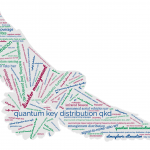Data privacy in the world of quantum, 5G, AI And the Metaverse

(Forbes) Denis Mandich, the CTO of Qrypt, a post quantum cryptography company, and founding member of the Quantum Economic Development Consortium has authored an article discussing privacy in the era of quantum, 5G, AI and the Metaverse. IQT-News summarizes below.
Quantum Tech Pod Episode 29: Post-Quantum Cryptography with Denis Mandich, Qrypt CTO
5G is inevitable, and it will usher in a new era of data access, connectivity and services. AI has already advanced in leaps and bounds during the 2010s, with quantum poised to follow a similar trajectory this decade. The convergence of these three technologies promises extraordinary new digital experiences extending well into the metaverse and augmented reality. However, there are inherent risks impossible to escape but essential to understand and minimize.
Processing vast amounts of actionable data requires advances in AI which will leverage the nearly incomprehensible potential of quantum computers. They will characterize human interactions and invisibly produce machine responses in real time—run by corporations in an unregulated market. While it is obvious for self-driving cars, the same tools can be applied to online interactions and navigating interpersonal relationships.
The complexity of these combined systems could lead to unintended consequences, but many are predictable. Bias can be implicit in statistical models, and human behavior is often repetitive and routine. The question becomes what should be private information.
It is to adopt new controls and guarantees on our communications by default. Speaking with classmates in 2000 didn’t require reading a EULA or sifting through a settings menu to keep it secret. In a quantum AI-enabled 5G network, we can demand post-quantum cryptography and end-to-end encryption to allow us to speak freely without anyone watching.
Considerations For The Tech Industry
Business leaders creating these technologies can self-regulate and agree to standards for disclosure and data collection. Placing industry-driven limitations will level the playing field for any virtualized enterprise and ensure no one company exploits data access for commercial advantage. This should extend to remote employees of any business where they can build esprit de corps without fear of monitoring by their employer for lunch meetings, virtual coffee hours, etc.
Once data is collected, analyzed, packaged and sold, it becomes persistent and almost impossible to delete—it is scientifically valid to use it to make decisions, in contrast to collecting and operationalizing it. Getting our technology future established on a privacy-based foundation is essential to avoiding costly fixes in the future.
Privacy has a very different meaning in different countries. For example, in China, some would argue there is almost no boundary between public and private information, where everything from jaywalking to internet search terms to business data can be monitored by physical and virtual surveillance networks.
While this level of intrusion would likely not be tolerated by the average American, commentators have pointed out that technology is being used to subtly erode privacy in the U.S. and that the roadmap for desensitizing technology users to a less-private world has begun. Enjoying the benefits of technology has a price, requiring guardrails for businesses and individuals alike.
Sandra K. Helsel, Ph.D. has been researching and reporting on frontier technologies since 1990. She has her Ph.D. from the University of Arizona.



















